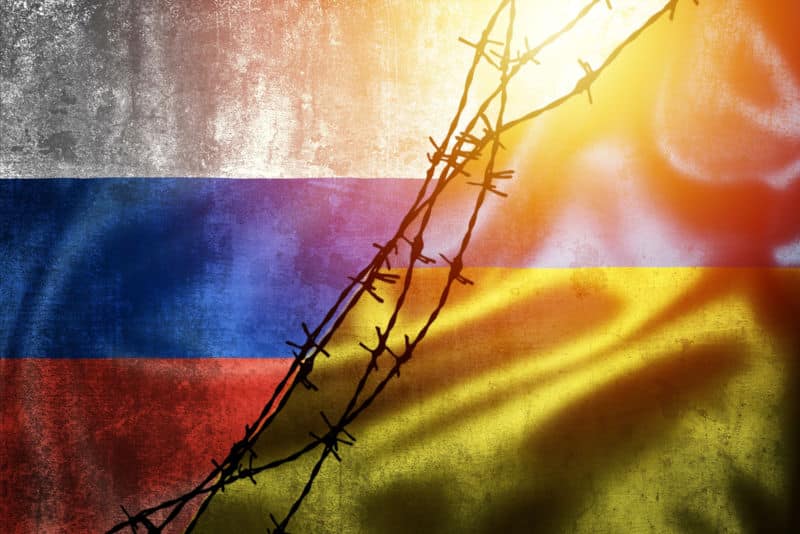Newsletter Signup - Under Article / In Page
"*" indicates required fields
Europe has been blindsided by its biggest war in decades with Russia’s invasion of Ukraine. Amid a raging humanitarian crisis, the biotech industry is preparing for increasing economic uncertainty, cyber threats, and clinical trial disruptions.
The invasion of Ukraine by Russian forces last week caused a widespread outcry from the European community. The geopolitical landscape has undergone a historic shift and the tragic consequences of the event are rippling out to the European biotech industry.
“The conflict in Ukraine is above all an enormous and deplorable shock to all of us,” said Miguel Forte, CEO of the Belgian regenerative medicine specialist Bone Therapeutics. “Our thoughts should go for those people, both in Ukraine and Russia, directly affected by reckless and irresponsible leadership.”
The crisis has many facets and the biotech industry in Europe is preparing itself for challenges on a number of fronts.
The human crisis
The human cost of the invasion is expected to be heavy, with deaths and injuries from the conflict currently numbering in the hundreds, and a growing number of refugees moving west.
The supply of lifesaving medications to and from the region are already being disrupted; the World Health Organization recently reported an urgent shortage of oxygen for use in healthcare in Ukraine. Another factor at play is the clamping down on air travel and shipments to and from Russian companies.
“The primary and immediate consequences will be affecting Ukraine, but the impact could also likely be felt in Russia and for the Russian population,” said Forte. He added that other countries could be hit indirectly by the chaos.
For life science companies, the impact will be strong in countries close to the epicenter of the conflict, including the Baltic states and Eastern European nations. These countries are facing uncertainty from the neighboring crisis, and many resident companies have employees and close contacts in Ukraine.
In the Lithuanian life sciences industry, there are “companies that have business units, collaborations, and clients in Ukraine, which now has stopped,” said Monika Paule, CEO of the Lithuanian gene editing specialist CasZyme. “Companies are willing to relocate their employees, move collaborations to other countries, but all hope to get back to operations in Ukraine when the conflict is over.”
While countries close to the conflict face large challenges, Paule sees life science companies in these regions also playing a strong role in alleviating the situation.
“The sector is ready to help Ukraine by all means during and after the conflict either with medical supplies or bringing business activities back to the country,” she said.
Clinical trials caught in the middle
European biotech companies now face delays to clinical trials that are being run in Ukraine and Russia. The two countries have increasingly contributed to international studies over the last 10 years thanks to easy access to patient populations; Forte told me there are currently about 500 ongoing studies in Ukraine and over three times more in Russia. The ability of the sponsors, contract research organizations, and suppliers to keep going during the invasion is limited.
“We can expect centers in Ukraine to shut down immediately to protect its staff and patients,” said Antoine Papiernik, Managing Partner of the investment firm Sofinnova Partners. “For Russian centers, the integrity of data from those sites might be at stake, and trials that are reliant on those sites will likely be affected.”
Overall, Forte advises that big pharma and biotech companies focus on maximizing the safety of clinical trial staff and participants in affected regions. To compensate for the trial shortfall, companies may ramp up recruitment efforts in countries away from the war zone.
However, the shifts will likely mean that Ukrainian and Russian patients lose access to many experimental treatments. Even patients that are included in clinical trials in affected regions could have poorer monitoring from clinicians due to the challenging conditions.

Financial consequences threaten biotech stocks
In addition to the human tragedy caused by the events in Ukraine, financial aftershocks are expected. Many European nations have launched a volley of sanctions against Russia and its ally Belarus. These include bans on investments flowing to Russia-based banking and oil industries in addition to the removal of some Russian banks from SWIFT, the international financial transactions system.
The current conflict and resulting sanctions on Russia could have direct and psychological repercussions on the overall business environment in Europe and scare off already risk-averse investors from the biotech scene. Forte sees less impact on early-stage private investment, but bad news for public biotech firms and life sciences companies at later stages of drug development. This blow comes as biotech stocks are already in an anemic situation due in part to inflation fears.
“It was already tough in Europe since the beginning of the year, and it might worsen even more,” said Bertrand Delsuc, founder of the business intelligence firm Biotech Radar. “Cash is king, more than ever.”
Nonetheless, Papiernik is confident that the biotech industry can pull through.
“Biotech has, in the past, demonstrated resilience compared to many other industries,” said Papiernik. “Protecting human lives in the immediate term remains the priority, but I hope we can also preserve the infrastructure enabling us to develop drugs that will help patients in need over the long term.”
Cyberthreats to life sciences grow
Part of the modern military arsenal is cyberattacks, and cyber threats are growing as Europe and the US slap economic sanctions on Russia.
“Several cybersecurity agencies and government bodies have warned about Russia’s ability to retaliate asymmetrically through cyber means,” said Charles Fracchia, CEO of the US firm BioBright. “This means that any sectors of the EU, NATO, and the US economy are likely to be targets, including critical sectors such as banking, healthcare, and life sciences. In life sciences, the threat is probably highest for critical operations such as vaccine manufacturing, biomanufacturing more broadly, and large clinical centers.”
Life sciences companies have been caught in the crossfire in the past; the US big pharma MSD lost over €1B in 2017 when it was hit by malware known as ‘notPetya,’ designed by Russia to target Ukraine. It took until January 2022 for MSD to claw back damage payments from insurers.
“The notPetya attack was ostensibly not targeted at [MSD], and yet, it had this enormous effect, thousands of miles away,” said Fracchia. “[MSD] was big enough to withstand this, but it is clear that our industry could not withstand a targeted attack, to say nothing of the smaller biotech’s ability to survive altogether.”
To endure pressing threats from cyberattacks, biotech companies are advised to assess their security measures and keep them up to date.
Europe’s biotech industry braces itself
Despite the bleak conditions in Ukraine, there might be a silver lining in the long term. European countries are presenting an increasingly united front against Russia’s actions in Ukraine, which could strengthen links between Europe’s various life sciences hubs, and improve the supply chains of medicines to Ukraine.
In addition, the EU is considering lowering its dependence on Russian fossil fuels by increasing investments in renewable energy. This move could benefit biotech companies that aim to usher in a circular bioeconomy.
For now, there are numerous ways that biotech companies can weather the current geopolitical storm. Many biotech players have signed a pledge to halt business activities with Russian companies and investors.
According to Paule, biotech companies can help the situation in Ukraine by focusing on how to use their contacts and resources to bring medical supplies to those in need, in addition to providing work to Ukrainians coming to the rest of Europe.
And, as Forte added, biotech startups should be confident that their efforts will bear fruit in the difficult situation, “even if at this stage there seems to be little space for optimism.”
Cover image via Elena Resko






